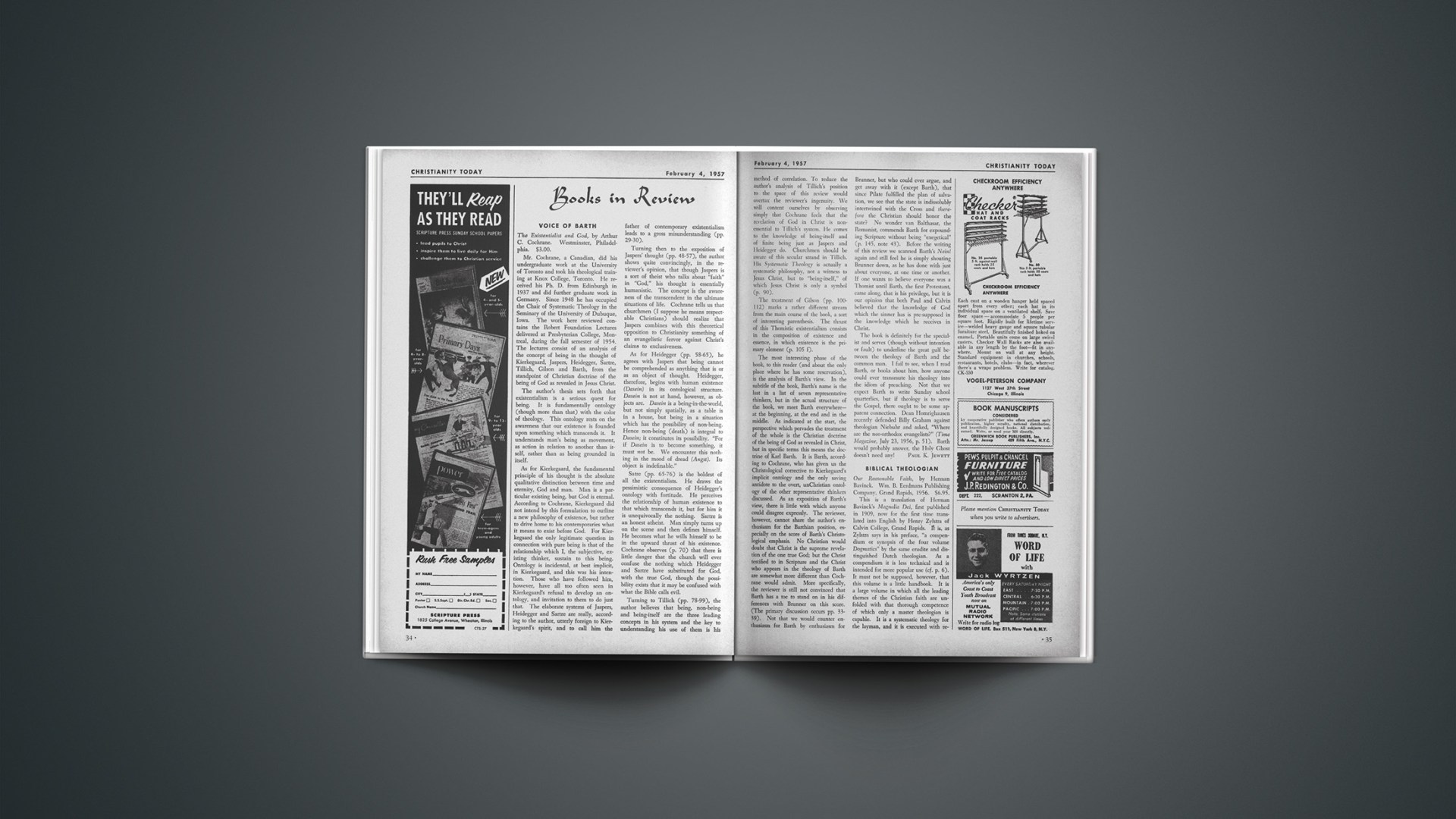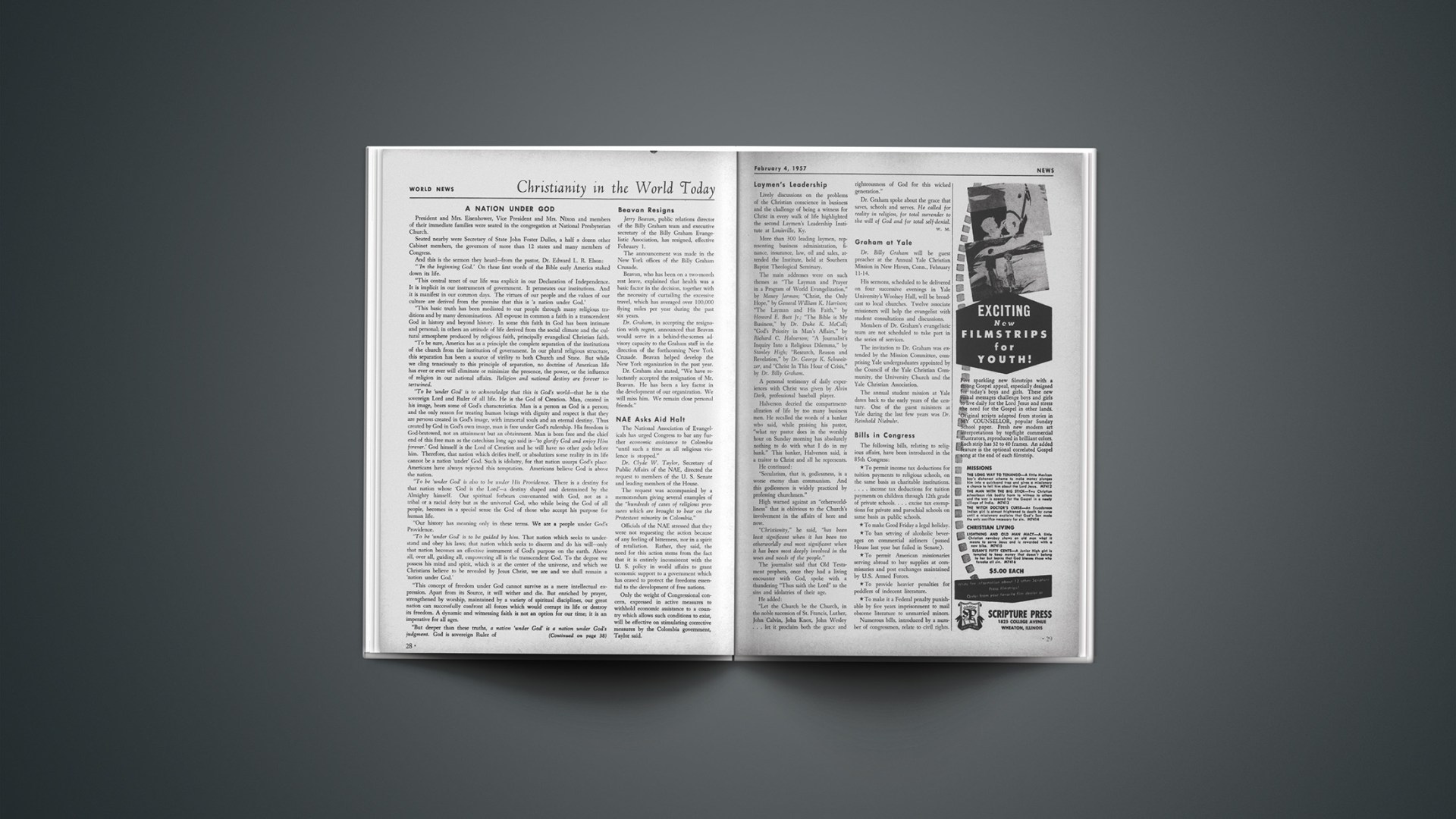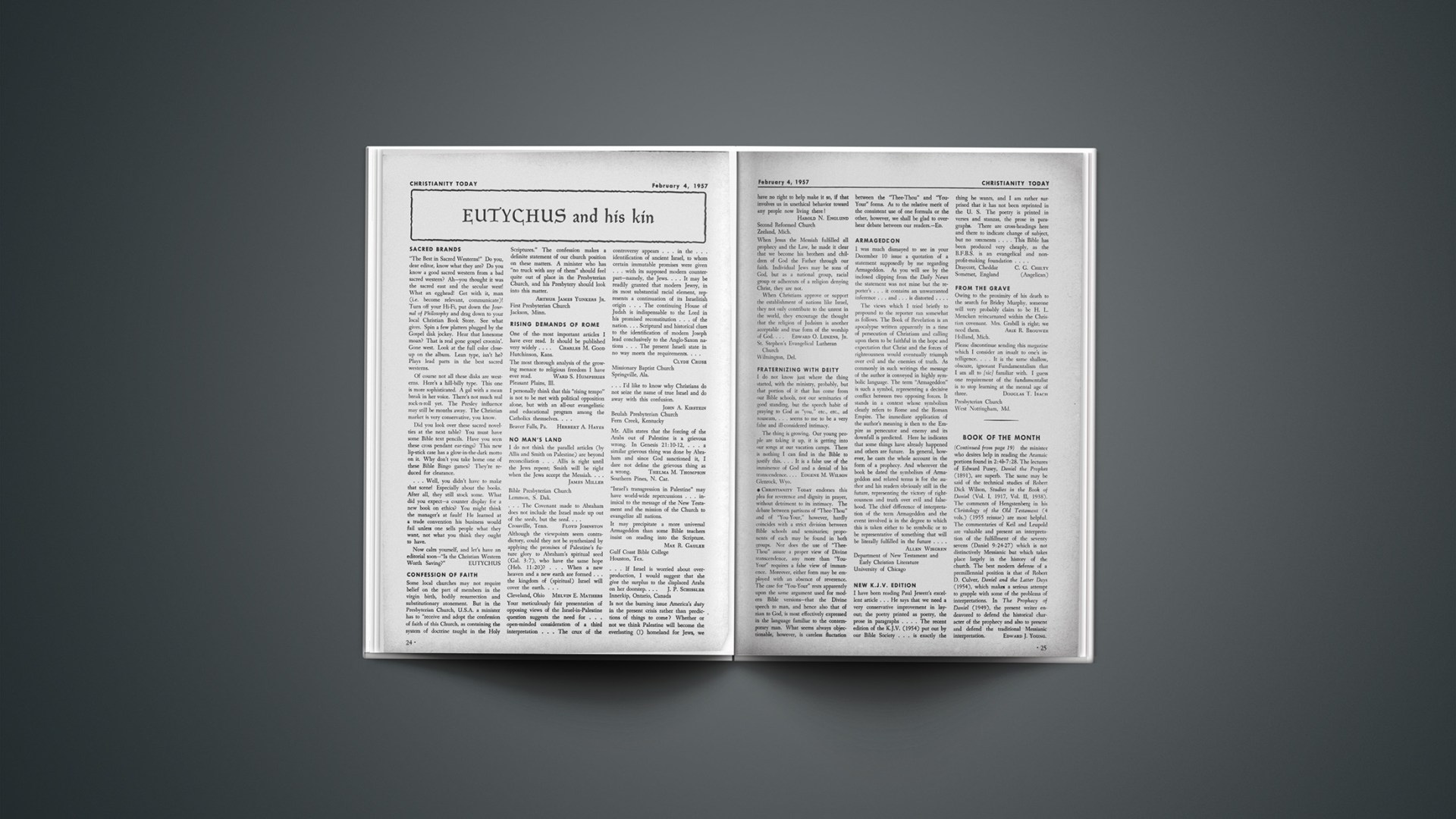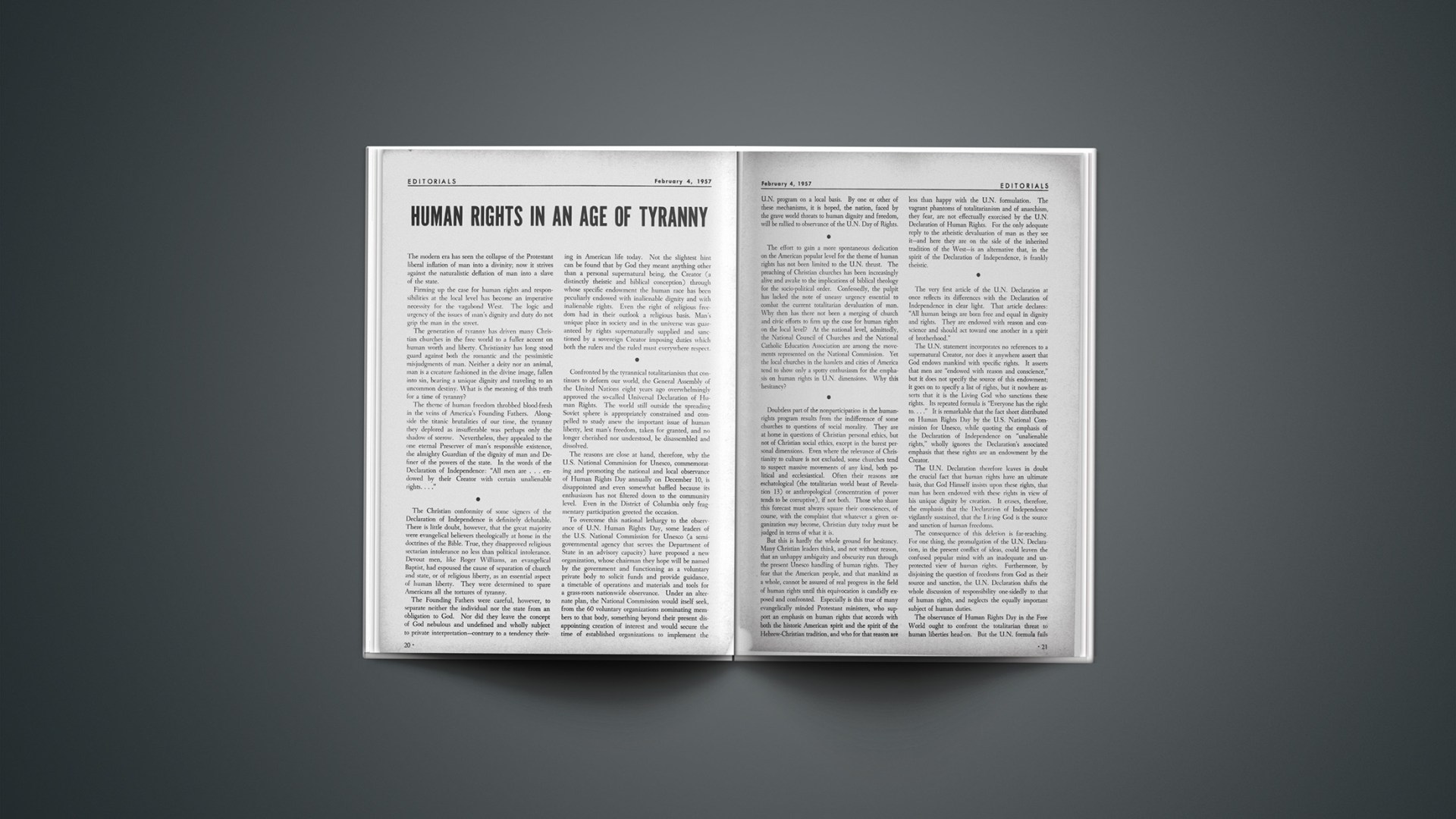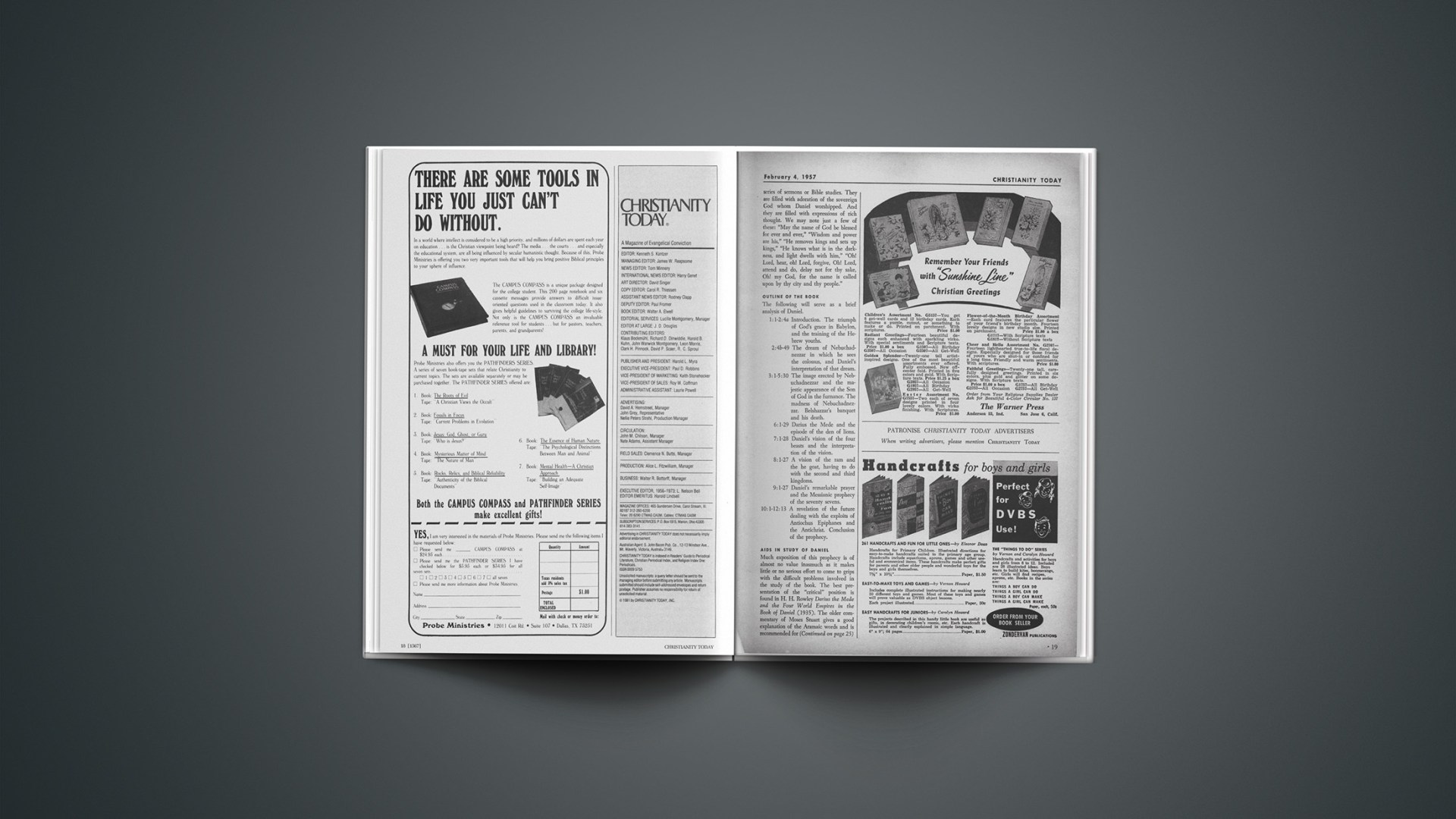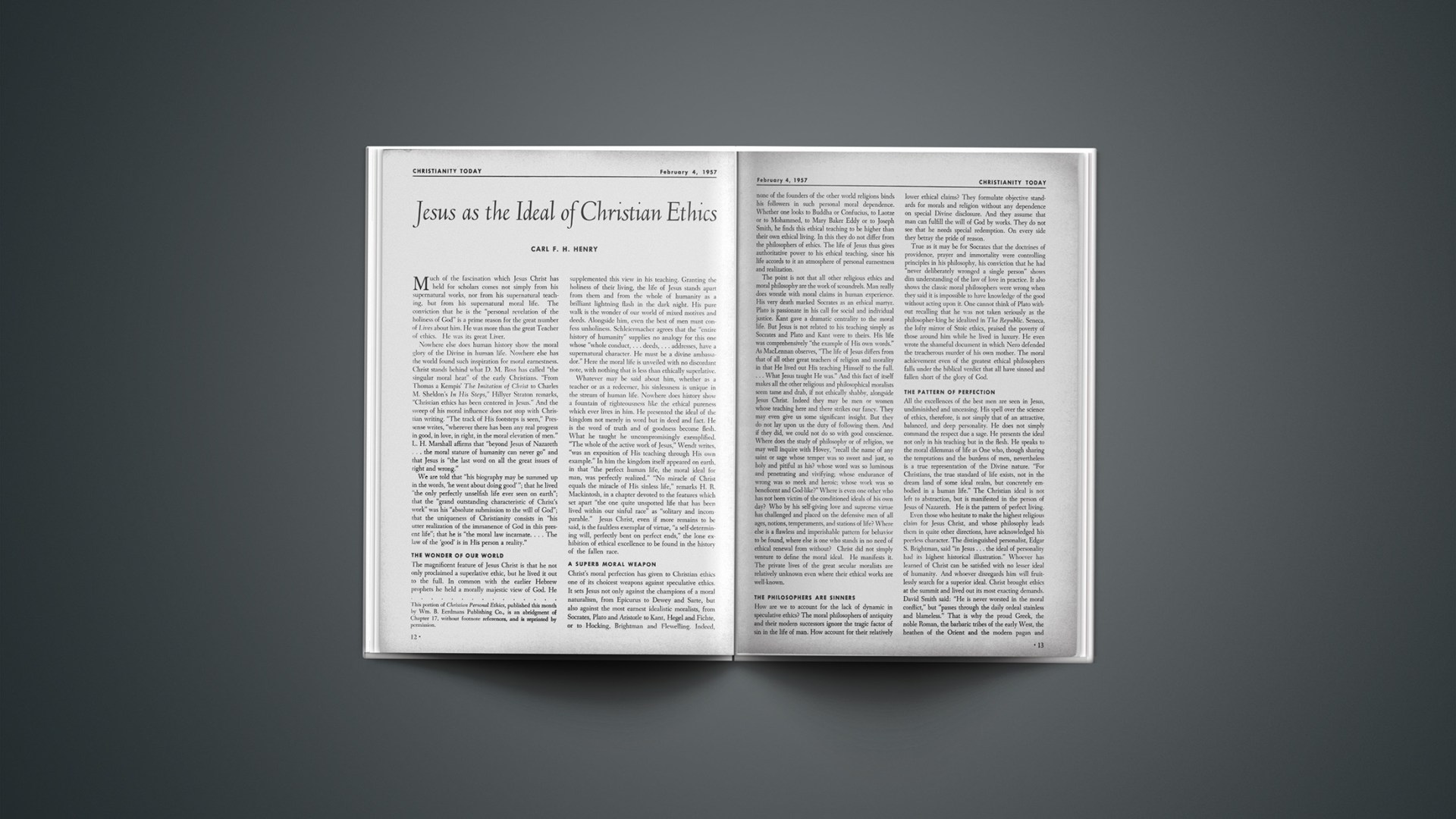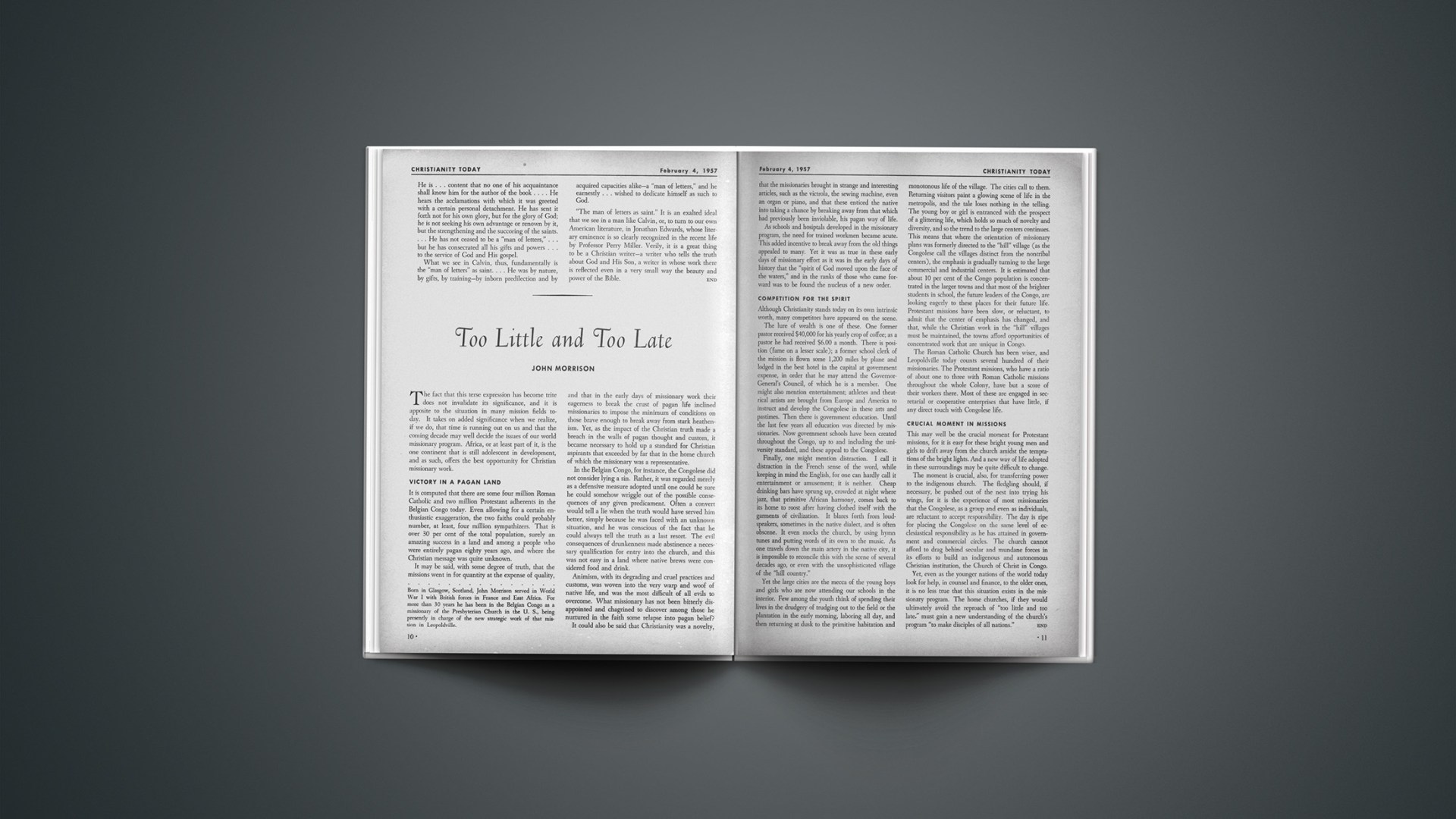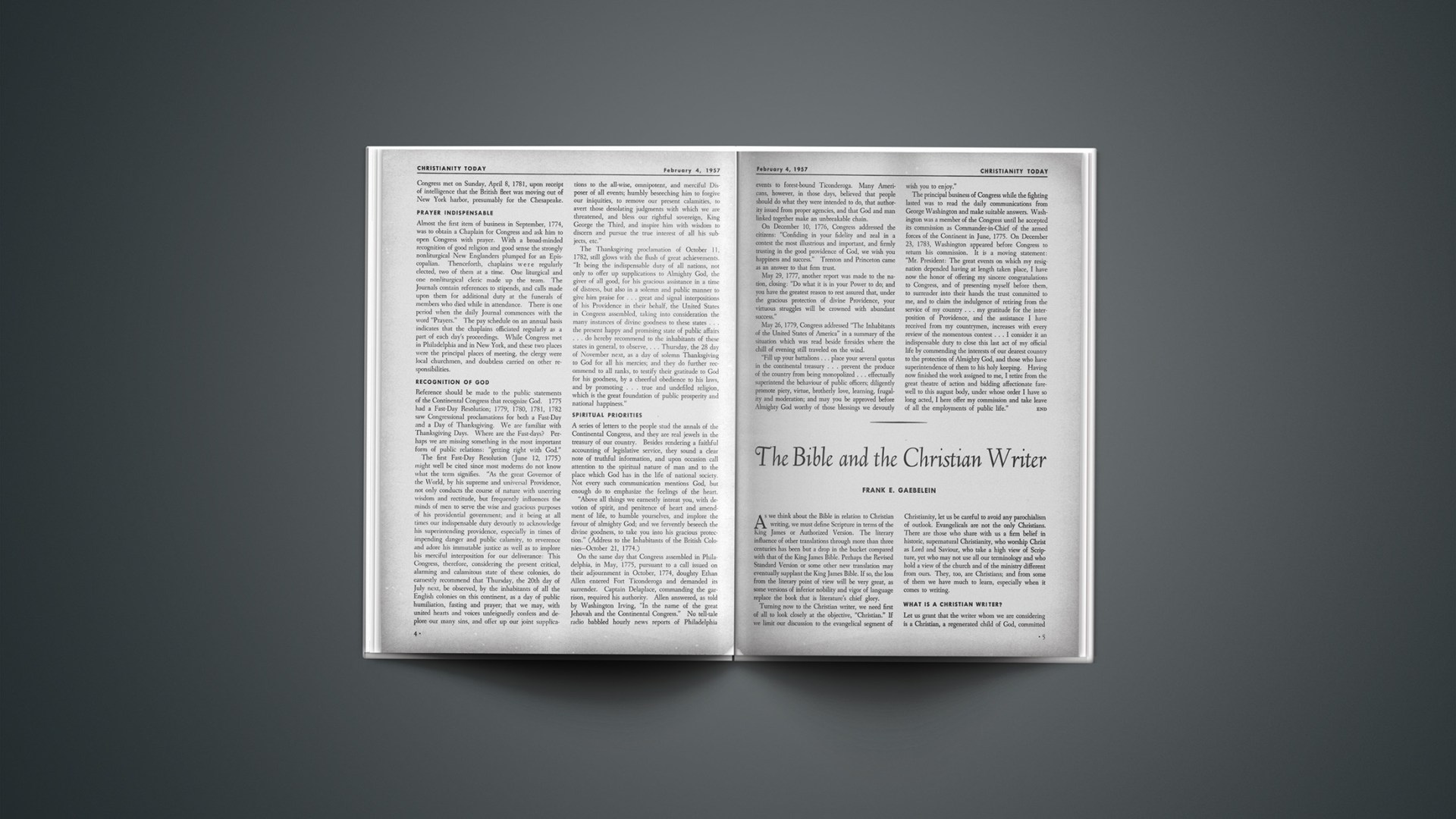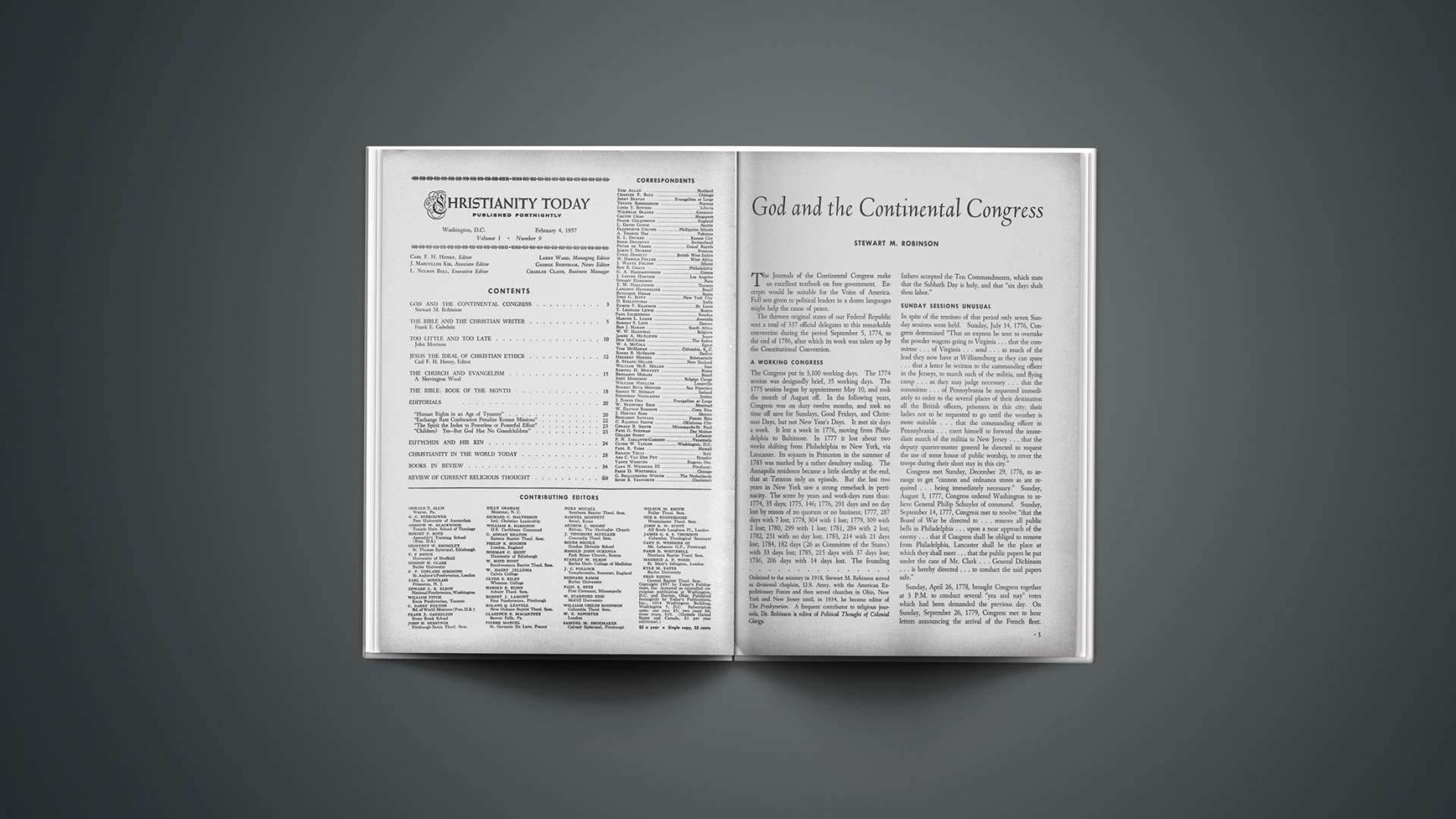Voice Of Barth
The Existentialist and God, by Arthur C. Cochrane. Westminster, Philadelphia. $3.00.
Mr. Cochrane, a Canadian, did his undergraduate work at the University of Toronto and took his theological training at Knox College, Toronto. He received his Ph. D. from Edinburgh in 1937 and did further graduate work in Germany. Since 1948 he has occupied the Chair of Systematic Theology in the Seminary of the University of Dubuque, Iowa. The work here reviewed contains the Robert Foundation Lectures delivered at Presbyterian College, Montreal, during the fall semester of 1954. The lectures consist of an analysis of the concept of being in the thought of Kierkegaard, Jaspers, Heidegger, Sartre, Tillich, Gilson and Barth, from the standpoint of Christian doctrine of the being of God as revealed in Jesus Christ.
The author’s thesis sets forth that existentialism is a serious quest for being. It is fundamentally ontology (though more than that) with the color of theology. This ontology rests on the awareness that our existence is founded upon something which transcends it. It understands man’s being as movement, as action in relation to another than itself, rather than as being grounded in itself.
As for Kierkegaard, the fundamental principle of his thought is the absolute qualitative distinction between time and eternity, God and man. Man is a particular existing being, but God is eternal. According to Cochrane, Kierkegaard did not intend by this formulation to outline a new philosophy of existence, but rather to drive home to his contemporaries what it means to exist before God. For Kierkegaard the only legitimate question in connection with pure being is that of the relationship which I, the subjective, existing thinker, sustain to this being. Ontology is incidental, at best implicit, in Kierkegaard, and this was his intention. Those who have followed him, however, have all too often seen in Kierkegaard’s refusal to develop an ontology, and invitation to them to do just that. The elaborate systems of Jaspers, Heidegger and Sartre are really, according to the author, utterly foreign to Kierkegaard’s spirit, and to call him the father of contemporary existentialism leads to a gross misunderstanding (pp. 29–30).
Turning then to the exposition of Jaspers’ thought (pp. 48–57), the author shows quite convincingly, in the reviewer’s opinion, that though Jaspers is a sort of theist who talks about “faith” in “God,” his thought is essentially humanistic. The concept is the awareness of the transcendent in the ultimate situations of life. Cochrane tells us that churchmen (I suppose he means respectable Christians) should realize that Jaspers combines with this theoretical opposition to Christianity something of an evangelistic fervor against Christ’s claims to exclusiveness.
As for Heidegger (pp. 58–65), he agrees with Jaspers that being cannot be comprehended as anything that is or as an object of thought. Heidegger, therefore, begins with human existence (Dasein) in its ontological structure. Dasein is not at hand, however, as objects are. Dasein is a being-in-the-world, but not simply spatially, as a table is in a house, but being in a situation which has the possibility of non-being. Hence non-being (death) is integral to Dasein; it constitutes its possibility. “For if Dasein is to become something, it must not be. We encounter this nothing in the mood of dread (Angst). Its object is indefinable.”
Satre (pp. 65–76) is the boldest of all the existentialists. He draws the pessimistic consequence of Heidegger’s ontology with fortitude. He perceives the relationship of human existence to that which transcends it, but for him it is unequivocally the nothing. Sartre is an honest atheist. Man simply turns up on the scene and then defines himself. He becomes what he wills himself to be in the upward thrust of his existence. Cochrane observes (p. 70) that there is little danger that the church will ever confuse the nothing which Heidegger and Sartre have substituted for God, with the true God, though the possibility exists that it may be confused with what the Bible calls evil.
Turning to Tillich (pp. 78–99), the author believes that being, non-being and being-itself are the three leading concepts in his system and the key to understanding his use of them is his method of correlation. To reduce the author’s analysis of Tillich’s position to the space of this review would overtax the reviewer’s ingenuity. We will content ourselves by observing simply that Cochrane feels that the revelation of God in Christ is nonessential to Tillich’s system. He comes to the knowledge of being-itself and of finite being just as Jaspers and Heidegger do. Churchmen should be aware of this secular strand in Tillich. His Systematic Theology is actually a systematic philosophy, not a witness to Jesus Christ, but to “being-itself,” of which Jesus Christ is only a symbol (p. 90).
The treatment of Gilson (pp. 100–112) marks a rather different stream from the main course of the book, a sort of interesting parenthesis. The thrust of this Thomistic existentialism consists in the composition of existence and essence, in which existence is the primary element (p. 105 f).
The most interesting phase of the book, to this reader (and about the only place where he has some reservation), is the analysis of Barth’s view. In the subtitle of the book, Barth’s name is the last in a list of seven representative thinkers, but in the actual structure of the book, we meet Barth everywhere—at the beginning, at the end and in the middle. As indicated at the start, the perspective which pervades the treatment of the whole is the Christian doctrine of the being of God as revealed in Christ, but in specific terms this means the doctrine of Karl Barth. It is Barth, according to Cochrane, who has given us the Christological corrective to Kierkegaard’s implicit ontology and the only saving antidote to the overt, un Christian ontology of the other representative thinkers discussed. As an exposition of Barth’s view, there is little with which anyone could disagree expressly. The reviewer, however, cannot share the author’s enthusiasm for the Barthian position, especially on the score of Barth’s Christological emphasis. No Christian would doubt that Christ is the supreme revelation of the one true God; but the Christ testified to in Scripture and the Christ who appears in the theology of Barth are somewhat more different than Cochrane would admit. More specifically, the reviewer is still not convinced that Barth has a toe to stand on in his differences with Brunner on this score. (The primary discussion occurs pp. 33–39). Not that we would counter enthusiasm for Barth by enthusiasm for Brunner, but who could ever argue, and get away with it (except Barth), that since Pilate fulfilled the plan of salvation, we see that the state is indissolubly intertwined with the Cross and therefore the Christian should honor the state? No wonder van Balthasar, the Romanist, commends Barth for expounding Scripture without being “exegetical” (p. 145, note 43). Before the writing of this review we scanned Barth’s Nein! again and still feel he is simply shouting Brunner down, as he has done with just about everyone, at one time or another. If one wants to believe everyone was a Thomist until Barth, the first Protestant, came along, that is his privilege, but it is our opinion that both Paul and Calvin believed that the knowledge of God which the sinner has is pre-supposed in the knowledge which he receives in Christ.
The book is definitely for the specialist and serves (though without intention or fault) to underline the great gulf between the theology of Barth and the common man. I fail to see, when I read Barth, or books about him, how anyone could ever transmute his theology into the idiom of preaching. Not that we expect Barth to write Sunday school quarterlies, but if theology is to serve the Gospel, there ought to be some apparent connection. Dean Homrighausen recently defended Billy Graham against theologian Niebuhr and asked, “Where are the neo-orthodox evangelists?” (Time Magazine, July 23, 1956, p. 51). Barth would probably answer, the Holy Ghost doesn’t need any!
PAUL K. JEWETT
Biblical Theologian
Our Reasonable Faith, by Herman Bavinck. Wm. B. Eerdmans Publishing Company, Grand Rapids, 1956. $6.95.
This is a translation of Herman Bavinck’s Magnalia Dei, first published in 1909, now for the first time translated into English by Henry Zylstra of Calvin College, Grand Rapids. It is, as Zylstra says in his preface, “a compendium or synopsis of the four volume Dogmatics” by the same erudite and distinguished Dutch theologian. As a compendium it is less technical and is intended for more popular use (cf. p. 6). It must not be supposed, however, that this volume is a little handbook. It is a large volume in which all the leading themes of the Christian faith are unfolded with that thorough competence of which only a master theologian is capable. It is a systematic theology for the layman, and it is executed with remarkable skill. The person unversed in the technicalities of theological discussion needs to have no hesitation in undertaking the reading of this volume. It is meant for him.
If one wishes to know the distinguishing features of the unpardonable sin, he will find one of the finest expositions to be found anywhere and much misunderstanding and confusion will be corrected (pp. 253 f.). In the chapter on the covenant of grace it is gratifying to find that Bavinck uses the expression “the counsel of redemption” to designate the arrangements between the persons of the Godhead in distinction from “the covenant of grace” as the historical actualization of that counsel (pp. 260–279). Bavinck also rejects the distinction between the external and internal covenant as a distinction which “cannot stand in the light of the Scriptural teaching” (p. 279). Thorough Calvinist as Bavinck was he does not rationalistically rule out the will of God to the salvation of all, that God “wants all men to be saved and to come to the knowledge of the truth” and he appeals to 1 Timothy 2:4; 2 Peter 3:9 in this connection (pp. 360 f.). He insists, and the present writer thinks rightly, that hell in Acts 2:27 must mean grave (p. 365). If we wish to know how Bavinck interprets such a difficult text as Ephesians 1:23, he tells us (p. 383 f.). In reference to the “water” of John 3:5, he says that “Jesus is not in the first place thinking of baptism”; water is the image of renewal and purging (p. 426). Yet, if we are a little troubled that in our evangelical tradition sufficient significance is not attached to baptism as the rite of initiation into the fellowship of the church, we may listen to Bavinck again: “Viewed in this way, baptism was in very fact a preservation, like that of the ark which spared Noah (1 Peter 3:20–21), a dying and being raised again with Christ (Rom. 6:3–4), a washing away of sins (Acts 22:16), a break with the world and an entrance into a new fellowship” (p. 524). For all of us some difficulty arises in connection with the distinction between the completed accomplishment of redemption and its application. Not a little help can be derived from the distinction which Bavinck develops between property by deed and actual possession (p. 455). These are but a few random examples of how rewarding a perusal of this volume can be.
The simplicity of presentation will not conceal from the discerning reader the maturity of thought which lies back of this exposition of the biblical system of truth. Neither will it conceal the amazing knowledge of Scripture which the author had at his command. It would be difficult, if not impossible, to find another book which is so fully documented by quotation and citation of Scripture. This evinces that Bavinck was essentially a biblical theologian. And because this is so, every chapter breathes the atmosphere of that godliness which persuasion of the truth creates. In this respect Our Reasonable Faith is like its great predecessor in the Reformed tradition, The Institutes of the Christian Religion; it is written in the interests of Christian devotion, faith united with a serious fear of God. “God, and God alone, is man’s highest good” (p. 17). It is with these words the book begins.
The scientific theologian will not find it a waste of time to mark up this volume. He will find gems of theological exposition and formulation. For example, what could be better than Bavinck’s formulation of the relation of time and space to creation (pp. 169 f.)? And, when in these days the doctrine of the church is so much in the forefront
of thought and discussion, what could be more rewarding than a careful study of the chapter on “The Church of Christ” (pp. 514–543)?
The translator evidences throughout his sensitivity to the demands of literary taste and form, and this adds greatly to the readability of the translation. An occasional footnote by the translator, however, would have been in order as, for example, a correction of Bavinck’s slip reproduced in the translation at the middle of page 380. And the omission of the name of God from the translation of Hepp’s tribute to Bavinck (p. 11) leaves a startling, though erroneous, first impression of what Hepp actually said and of what Zylstra intended to say.
JOHN MURRAY
Theological Background
English Thought: 1860–1900. The Theological Aspect, By L. E. Elliott-Binns. (Longmans). 28s.
The late Canon Vernon Storr published in 1913 his book on The Development of English Theology in the Nineteenth Century: 1800–1860. He had intended to produce a companion volume dealing with the latter half of the century but was prevented from doing so by the pressure of other work. We now have a volume from Canon Elliott-Binns treating the subject over this period from a wider outlook than Canon Storr had in mind, for as the author rightly says the theological viewpoint can only be seen in true perspective when set against the background of prevailing trends of thought in other fields.
Beginning with the impact of natural science upon theology and religion, the author traces the influence of philosophy, archaeology and the critical views of German theologians on biblical studies in this period, together with the development of dogmatic theology, sacramental teaching and the position of Church and State. In such a book one would expect this ground to be covered. But where Dr. Elliott-Binns puts us particularly in his debt is in relating these theological considerations to the political, economic and social conditions of the times, to which he has added a study of the general literature and spread of liberal views associated with that period.
Though one is constantly impressed with the immense range of the author’s reading, as indicated both by quotations and footnotes, yet his learning is so easily presented that this book is a sheer delight to read. His own comments on the different situations and problems are shrewd and penetrating; for example, in dealing with dogmatic theology he states “Dogmas are working hypotheses to be tested by practical religious experiment, and every age must conduct its own tests and be prepared if necessary to make the consequent adjustments, for a too rigid doctrinal system may erect barriers to the fuller knowledge of things divine and preclude further progress. The Christian faith is not a kind of Maginot line behind which the Church takes shelter against the intrusion of new and unwelcome ideas” (p. 213).
Two major impressions are left by this book upon the· mind of at least one reader. First, the immense prestige acquired by German theologians during the period, so that for a time many British scholars accepted their findings as being almost above criticism. Though this docile spirit and submissive attitude were not universal, yet such teaching did considerable harm in undermining popular views on the inspiration of the Bible, leading to a general opinion that as its text was unreliable, so its message was obsolete. Second, the dominant position of Westcott in England at the close of the century. Though as a pure scholar he may not have been the equal of either Lightfoot or Hort, yet his influence was in his day more widespread than theirs, due to his deep concern over the social problems of the times and over the expansion of the Church in other lands. By seeming to see the past by the light of the present and its needs, by his emphasis on the teaching of the Fourth Gospel and by his knowledge of the Greek Fathers, he helped to change the direction of theological thought in this country. But if Westcott was the outstanding personality, and Lightfoot “the greatest interpreter of the New Testament”, to Hort belongs the distinction of producing what is described as “one of the most valuable and suggestive theological works produced in England during the period”, entitled The Way, the Truth, the Life. Quotations from it go far to substantiate this claim for a volume which has been largely forgotten.
In the long view, the development of psychology presented a greater danger to religion than the attacks of science, and not the least valuable section of the book is that dealing with this subject and the effect of its early pronouncements upon the uninstructed public.
Many of the problems and difficulties with which the church is faced today in England, and indeed in other countries, owe their origin to events and trends of thought which began about a century ago. A true understanding of these problems can only be gained by examining their causes, and to read this book will enable the student, and general reader alike, to obtain a wide understanding of the many factors which have contributed towards the religious climate of our own times.
G. C. B. DAVIES.
Stimulating Reprint
Luke The Physician, by William M. Ramsay. Baker Book House, Grand Rapids. $4.50.
Sir William Ramsay’s mind was that of an eager, earnest scholar who is determined to grapple with great problems. This series of studies (reprinted from the 1908 edition) deals with a variety of unrelated subjects and exhibits the wide range of the author’s interest and the carefulness of his scholarship.
Indeed, it is perhaps in this that the significance of Ramsay’s work consists: not so much in the conclusions reached, as in the methods used and the attitude which characterizes his consideration of New Testament problems. Many of the particular points he makes may seem somewhat dated, after the passage of fifty years or more. His treatment of Harnack on Luke, or Sunday on New Testament criticism, may not have the relevance it once possessed. His conclusions as to the authorship of Hebrews are interesting, and his study of the original sources of our gospel records is stimulating, but the picture which the author gives of himself is far more valuable than any of these things or the sum of them.
Here is a man who proceeds on the basis that “when a real piece of living literature is to be examined, it is a false method to treat it as a corpse, and cut it in pieces: only a mess can result” (p. 3). He lashes out against “so-called critics” who “do not read a book whose results they disapprove” (p. 8). He sees that “ideas are not like dead matter to be placed side by side: they unite and are productive, or they die; but they cannot remain inert and unvarying” (p. 125). His protest against mere cleverness in scholarship is excellent (p. 250).
The book will have a limited appeal because of the technical nature of its subject matter, and because it deals with some themes which are not of great concern today. But to those who share Ramsay’s concern for the problems of the history of religion, it offers much that is rewarding.
H. L. FENTON, JR.
CHRISTIANITY TODAYis a subscriber to Religious News Service, Evangelical Press Service and Washington Religious Report Newsletter.

